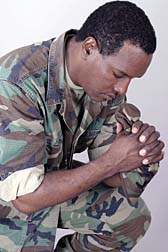 Just ask the 23 troopers who filed a civil rights lawsuit earlier this month in New Jersey, accusing the state police of routinely discriminating against minorities in promotions, training, special assignments and discipline.
Just ask the 23 troopers who filed a civil rights lawsuit earlier this month in New Jersey, accusing the state police of routinely discriminating against minorities in promotions, training, special assignments and discipline.The allegations center on the failure of the New Jersey State Police to practice fair employment law and rise above a promotion system that the suit calls "arbitrary, antiquated and subjective" and fraught with the kind of cronyism that breeds employee racial discrimination. The suit contends that such employment discrimination has prevented 22 officers from rising above the rank of Sergeant, and that the force has retaliated against a Hispanic trooper who continued to push for changes after being promoted to Captain.
While a spokesperson for the State Attorney General's Office contends that promotion rates for white, and non-white troopers has been virtually identical, the plaintiffs point to the fact that nearly 85 percent of troopers who hold higher rank in the force—including colonel, lieutenant colonel, major, captain and lieutenant—are white, and Caucasians comprise 83 percent of the full force compliment of 2,944 troopers.
The National Association for the Advancement of Colored People (NAACP) has been monitoring the State force's hiring process since 1992, the year in which the Association sued the New Jersey State Police over a four-year college requirement, and its recruitment and hiring practices. The lawsuit paved the way for the NAACP to monitor the Force over its hiring practices.
The latter stemmed from an 18-year consent decree dating back to 1975 that sought to increase minority representation to 14 percent. Since that decree ended in 1992 the 14 percent representation marker has risen only slightly, to about 17 percent, even as more than a third of the entire population of New Jersey is comprised of non-white residents.
"Because the system is totally discretionary based on supervisors' subjective beliefs and without any objective criteria, a mostly white hierarchy of the State Police repeatedly rank primarily Caucasians more highly and thus more deserving of promotion," attorney William Buckman, who is representing the troopers, wrote in the lawsuit.
A spokesperson for the Attorney General's Office of New Jersey noted that in January of this year the State Police promoted 13 percent of the 1,273 Caucasion troopers eligible for promotion, and 13 percent of eligible minority troopers. On the surface, those numbers would suggest equality. However, the fact remains that the make-up of the Force is not in line with the percentage of the overall New Jersey population, more than a third of which is comprised of visible minorities.
It should be noted that a new consent decree was advanced in 1999, a year after two Caucasion troopers were accused of shooting three unarmed men belonging to visible minorities during a traffic stop on the New Jersey Turnpike. The decree was aimed at reforming the entire system—everythng from how a trooper conducts a traffic stop to how detectives investigate inernal complaints. Part of the decree was the establishment of a test for promotions in an effort to eliminate racial profiling. However the test was scrapped in 2005 by then-Attorney General Peter Harvey after he found the test, which came at a pricetag of $235,000 allegedly didn't work.
READ MORE EMPLOYMENT LAW AND DISCRIMINATION LEGAL NEWS
In the meantime the Attoney General's Office contends that it has hired a consulting firm that has altready done work in New York, Pennsylvania and Delaware aimed at developing objective promotion criteria.
That's not good enough for the 23 minority troopers who are asking the trial judge to "address the outmoded and biased nature" of the State Police by requiring it to establish a new promotional system and immediately promote each of them by one rank. They are also seeking punitive damages, interest, the cost of the lawsuit and attorney's fees.
